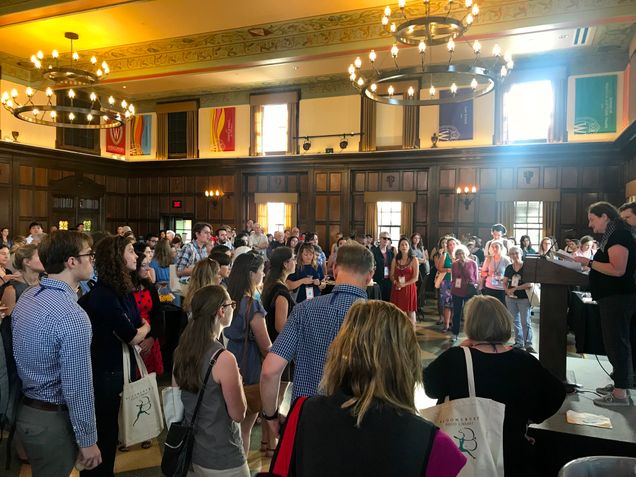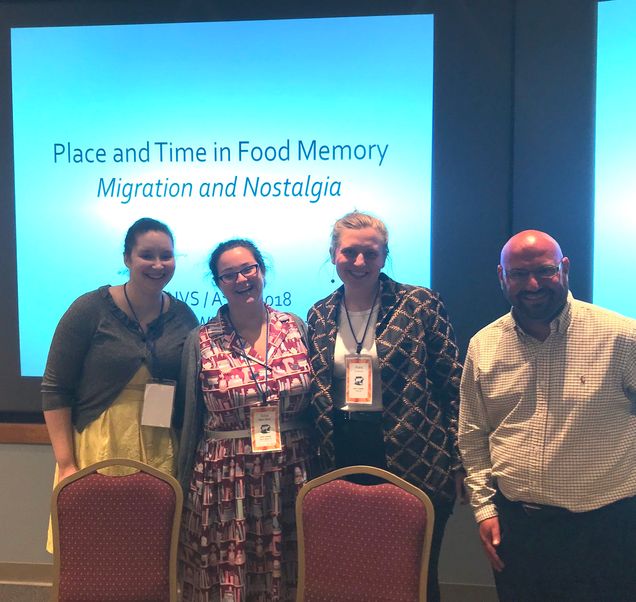Reflections from the 2018 AFHVS/ASFS Conference
We’re back from the big annual food conference, hosted this year at the University of Wisconsin-Madison. The conference is hosted by two academic organizations: The Agriculture Food and Human Values Society and the Association for the Study of Food and Society (hence, the conference is called AFHVS / ASFS). Current BU Gastronomy students attended and presented at the conference, and we asked them to share about their experience; read on to learn about how this conference experience is a great experience for any gastronaut, and tips and tricks for attending future meetings. Thanks to Alex Cheser, Esther Martin, and Ariana Gunderson for their comments.

What was your favorite moment of the conference?
Alex: Oh, gosh, this is hard. I can narrow it down to three moments that are my favorite for different reasons. First, I had never been to a university or program so vocal and inclusive about the area’s connection to its native peoples. From the Land Acknowledgement in the program to the amazing banquet dinner menu, the influence and presence of the Hooçak Nation was visible, revered, and welcomed in collaboration. Second, I was so happy that the LGBTQ social event I planned went so well. I just reached out to the organizers at UW on a whim and they were so receptive and excited. This kind of meet up hadn’t happened at AFHVS/ASFS before despite the visible presence of queer folks, so it was quite rewarding to feel the solidarity among the tiny group. Finally, and more selfishly, I revere the feedback I got from my presentation. I submitted it and presented it as a work in progress hoping to get constructive feedback and that’s exactly what I got and I kept getting it over the conference, even during the last event of the conference – two days after I’d presented. This is my second time at the conference and it’s such a supportive and uplifting environment.

Esther: My favorite moments were interacting with people I’d only admired from afar. I met and
spoke to some of my foodways/folklore heroes. Additionally, I got to bounce my ideas of other, more experienced scholars and get feedback, while connecting with peers going through the same grad school process as myself.
Ariana: At the welcome dinner, as I sipped local craft beer with a new friend, he reached out to a person passing our table. He cried out, “Lisa! How have you been?” and I realized which Lisa this was – Lisa Heldke, one of my favorite food studies authors. She turned to introduce herself to me and I said, “Hello! I’m Ariana Gunderson from BU’s Gastronomy Program. I’m quoting you in my presentation tomorrow!” Then we discussed the article I referenced in my talk – how often do you get to discuss a published text with its author!? Apparently, at AFHVS / ASFS, all the time!
How did this conference implement skills or themes from your Gastronomy degree?
Ariana: Amazingly, I was able to literally implement my Gastronomy work by presenting my research from my Introduction to Gastronomy course! But interacting with other scholars was the best way to apply my degree: In round-tables and post-panel Q&As, I watched other scholars work through questions and research findings just like we do in class. I could put faces to names of so many people whose work I’ve been reading since I started this program. Honestly, I was a little star struck! But Food Studies is such a welcoming discipline, everyone is open and friendly. Leading scholars listened thoughtfully as I described my research and joked with me about kombucha. Just go up and introduce yourself!
Esther: The conference emphasized the importance of an interdisciplinary approach to food studies. Nothing is ever just about food, and all parts of food intersect. Food policy can learn from food history while food justice can utilize skills of food folklore. We are not isolated in our specializations, but rather united in the common theme of food as a form of education and social change.
Alex: Most of the sessions I attended focused on food policy or restructuring the food system and agriculture. Having taken all three of Dr. Ellen Messer’s food policy courses in the program, I felt very prepared as I heard each presentation and could easily contextualize it within the current food policy landscape. I definitely would have felt a little overwhelmed without that knowledge. I also felt empowered to ask specific, in-depth questions which, if you’ve had class with me maybe isn’t a surprise haha, but at a conference with ~professional academics~ I would normally be a bit quieter.

What advice would you have for a gastronaut considering attending future ASFS conferences? Any dos or don’ts?
Esther: Definitely submit a proposal, even if you don’t have an idea for a paper yet. Almost
everyone changes a bit beforehand, and many people present new research ideas that aren’t finished or fully formed. If you can, meet the people you admire. Use social media as a way to reach grad students and young professionals. And have business cards! Even if they’re quick ones from Zazzle, they’ll have all your contact info on them so people can follow up with you.
Alex: Go! No matter where you are in your degree tenure and no matter if you plan to pursue academia or not, if you are able to attend this conference, you will not regret it. Presenting your own research is great practice and this is not an environment where you will be beat down if you haven’t considered something or read a specific work. Even if you don’t present your data, this is one of the two conferences (so I’m told) where the major academic work of re-figuring the food system to be more just, equitable, and sustainable is presented and teased out. (The other one is the Rural Sociology conference apparently). Anyone who is wanting to delve into food policy or food justice work will benefit to know what’s on the cutting edge of this research.
Ariana: Go if you can! Make it happen, you won’t regret it. Here are some tips: Before you go, look through the program of presenters and highlight any panels you know you want to attend (look for names you recognize). Bring business cards if you have them (but if you don’t do not worry). Prepare a three-sentence description of your research interests (vague is okay!) because people will ask you when you meet them. There are (limited) funding sources available from ASFS and BU (reach out to me or Barbara for more details) to help defray costs. If you join ASFS this year (2018) you are eligible to apply for funding from ASFS to attend the 2019 conference!